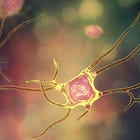Research Hit: Any Exercise at any Age Improves Brain Function
A new meta-meta analysis reviews all the data on exercise and brain performance - and it's good news
Is there really such a thing as a meta-meta analysis?
Well, normally we would call this an umbrella review when all the data in a given research field is reviewed.
For those of you who are not scientists or involved in academia: first there are studies that aim to study something in a structured way. This gives us one datapoint - and may not mean much and this will depend on how it was conducted and the size of the study, etc, etc. Hence scientists never get very excited about one study (if it’s not your study, that is!).
But once we have a large amount of studies on a topic (normally at least dozens) we can then start to be confident of a trend or clear outcomes. The key proof in the pudding is when these multiple studies are summarised in a systematic review or analysis which are basically reviews of multiple studies. If these point in the same direction, then you’ve got yourself some really solid evidence.
But some areas have lots, and lots, of research and multiple meta-analyses and then researchers may conduct an umbrella review reviewing all the meta-analyses.
This paper just out is labelled by the researchers: “…a systematic umbrella review and meta-meta-analysis.”
That sounds like a bunch of work?!
Indeed. It also gives us really solid evidence and a complete summary. For this they reviewed 133 meta-analyses which included over 250’000 participants of all ages and across multiple exercise interventions.
And the results are obviously positive, as you’ve reported on previously…
Yes, basically any exercise at any age improves brain, cognitive, function.
They do note some differences, for example low to moderate level exercise had the largest effects. Here the high-level summary
Exercise significantly improved general cognition (SMD=0.42), memory (SMD=0.26) and executive function (SMD=0.24).
Memory and executive function improvements from exercise were greater for children and adolescents than for adults and older adults (but still improved significantly)
Those with attention-deficit/hyperactivity disorder exhibited greater improvement in executive function than other populations.
Effects were generally larger for low- and moderate-intensity interventions.
Effects were quick, within three months (improvements can often be seen after just one exercise bout).
Shorter interventions (1–3 months) and exergames (video games that require physical movement) had the largest effects on general cognition and memory.
So what’s the recommendation?
Do any exercise you can, often - simply move a lot. This can be walking, any sport, Tai Chi (which had impressive results), and notably exergames. Simply, whatever you enjoy most and can sustain. It will boost your brain power, and have multiple knock on benefits in your life and health.
The same applies to a child, a young adult, in middle-age, and old age.
It should be noted that we also know a lot more about the actual processes and why this improves brain function - as I have reported on in these pages multiple times.
Some previous articles:
Reference
Ben Singh, Hunter Bennett, Aaron Miatke, et al.
Effectiveness of exercise for improving cognition, memory and executive function: a systematic umbrella review and meta-meta-analysis.
British Journal of Sports Medicine, 2025; bjsports-2024-108589
DOI: 10.1136/bjsports-2024-108589










